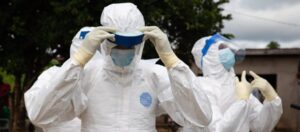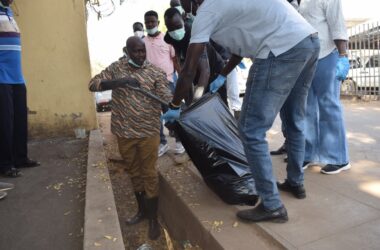
By Kei Emmanuel Duku
The South Sudan Ministry of Health has issued an urgent public health alert following the declaration of a new Ebola virus disease (EVD) outbreak in the neighboring Democratic Republic of Congo (DRC).
The Ministry of Health stated that the outbreak, confirmed on September 4, 2025, in the Kasai Province of the DRC, marks the 16th such outbreak in the country since 1976.
According to a press release dated September 5, 2025, the outbreak was identified after a 34-year-old woman, who was admitted to a hospital with a high-grade fever and vomiting, passed away.
As of the date of the release, 28 suspected cases and 15 deaths have been reported, including four healthcare workers. The Ministry noted that this specific strain of Ebola has a high case fatality rate of up to 90% if left untreated.
Ebola virus disease is a severe, often fatal illness in humans caused by an infection with the Ebola virus, a member of the Filoviridae family. The time from infection to the onset of symptoms, known as the incubation period, typically ranges from 2 to 21 days.
A person becomes contagious only when symptoms begin to appear. In its early stages, the signs of Ebola are often non-specific and can be mistaken for more common diseases like malaria or typhoid. Symptoms can appear suddenly and include a high fever, severe headache, extreme weakness, muscle and joint aches, and a sore throat.
As the disease progresses, symptoms become more severe and distinct. After a few days, the initial flu-like symptoms may be followed by vomiting, diarrhea (which can be bloody), a skin rash, impaired kidney and liver function, and stomach pain.
At more severe stages, the disease may present with unexplained internal and external bleeding and bruising. This can manifest as bleeding from the gums, eyes, nose, or in vomit and stool.
In response to the outbreak, the Ministry of Health is appealing to all South Sudanese citizens to remain vigilant and immediately report any suspected cases of fever, vomiting, diarrhea, or unusual bleeding to the nearest health facility.
The ministry is also stressing the importance of adhering to several key public health measures to prevent the spread of the virus.
The public has been urged to avoid physical contact with individuals showing symptoms of Ebola and to practice strict hand hygiene by regularly washing hands with soap and water or using alcohol-based hand sanitizers.
According to the pess release, the virus can be transmitted to humans through direct contact with the blood, secretions, organs, or other bodily fluids of infected wild animals, such as fruit bats, chimpanzees, gorillas, monkeys, and forest antelopes.
To reduce the chance of contracting the virus, the Ministry of Health urged the public to avoid direct contact with bodily fluids, including urine, blood, sweat, saliva, vomit, and stool, from suspected Ebola patients and to further avoid handling the bodies of persons who have died from Ebola-like symptoms.
Families whose relatives succumb to the virus should be supervised by designated health teams to ensure safe and dignified procedures while burying the deceased.
The Ministry has assured the public that it is working with the World Health Organization (WHO) and other partners to ensure a comprehensive and transparent response to the outbreak.




